The device called an e-cigarette is a big story in the news these days. They appeared on the market several years ago as a way to help smokers quit and now they are reaping in billions of dollars in sales every year. Controversies surround these devices; not least of which is the harm they may pose to children and teens. So what is an e-cigarette and what do you need to know about them to protect your children? Get the facts and talk to your kids about e-cigarettes before they experiment on their own.
What Are E-Cigarettes?
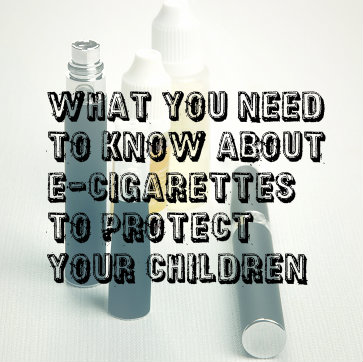 An e-cigarette is a device that uses a battery to warm a small vial of nicotine dissolved in liquid. The user inhales the vapor to get the nicotine and exhales water vapor. The idea is that a smoker can use an e-cigarette to get a nicotine fix without inhaling the thousands of harmful compounds that are in cigarette smoke and which cause health problems. Studies as to whether they really help people quit are ongoing. There is no definitive answer yet, but what seems to be clear is that e-cigarettes are useful for some smokers and not for others.
An e-cigarette is a device that uses a battery to warm a small vial of nicotine dissolved in liquid. The user inhales the vapor to get the nicotine and exhales water vapor. The idea is that a smoker can use an e-cigarette to get a nicotine fix without inhaling the thousands of harmful compounds that are in cigarette smoke and which cause health problems. Studies as to whether they really help people quit are ongoing. There is no definitive answer yet, but what seems to be clear is that e-cigarettes are useful for some smokers and not for others.
Are E-Cigarettes Harmful To Kids?
Although they don’t produce smoke, e-cigarettes are still devices that deliver a hit of a one of the most addictive substances, nicotine. Because e-cigarettes are marketed as a healthier alternative to smoking, most young people inaccurately assume there are no risks in using one. Nicotine is highly addictive and any child or teen using an e-cigarette is at significant risk of becoming addicted to it. There is also the risk of poisoning. Nicotine is poisonous in high doses and the liquid in the e-cigarette can be toxic.
Nicotine is a drug that affects the nervous system, the brain, and the heart. Someone abusing nicotine will experience an elevation in blood pressure and heart rate. High doses can cause a dangerous heart arrhythmia. In rare cases, and with large doses, this arrhythmia can be fatal. With their smaller bodies, kids are more vulnerable to these risks than adults are.
How Do I Protect My Kids from E-Cigarettes?
When it comes to any kind of drug, knowledge is power. Once you understand the risks and dangers associated with e-cigarettes, you can share them with your kids. You should have regular conversations with your kids about substance abuse, alcohol, peer pressure, smoking and other issues they face as children and as teens. Bring e-cigarettes into the conversation and make sure they understand that these devices are not safe.
Also make sure your kids understand how e-cigarette makers are specifically trying to target them to get them hooked on nicotine. The manufacturers make these devices with an array of flavors that mimic fruit, candy, cookies, and specific products that children love, even Girl Scout cookies. The companies making e-cigarettes have no qualms about targeting kids and teens in this way and they even sponsor events, like rock concerts, that attract young people.
Despite the risks, teens and even children are trying e-cigarettes. According to surveys, one in ten high school students has already tried e-cigarettes. As a parent, it is your job to stay on top of the changing landscape of harms and risks posed to your children and to protect them. By learning about e-cigarettes you can help your kids understand all the reasons they should avoid these devices. The risks of nicotine use are too great and we still don’t understand the full danger of e-cigarettes. Keep yourself and your children knowledgeable and you’ll empower them to make better choices.
Learn More About How E-Cigarettes Are Secretly Being Used To Hide Drug Use
The problem of prescription drug abuse is one that touches almost everyone in some way. Millions of Americans have abused prescription drugs and are at risk of becoming addicted or even of having a fatal overdose. Teens are particularly vulnerable and don’t always understand the dangers associated with prescriptions. Teens today are abusing prescription drugs in greater numbers than any other age group. Learn how to keep your teen safe in the face of this epidemic.
Which Drugs Are Teens Abusing?
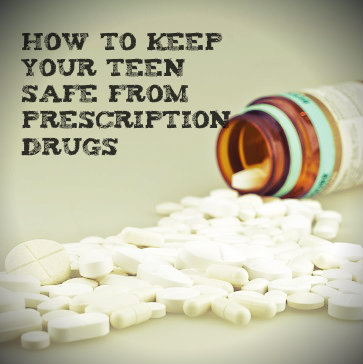 Teens are abusing prescription painkillers in record numbers. These are narcotic controlled substances and are highly addictive and easy to overdose on. In the last 20 years, the number of people between the ages of 12 and 17 that abuse these painkillers has increased ten-fold. No teen demographic is excluded from these statistics. Teens from all socioeconomic backgrounds, of all races, and of both genders are abusing painkillers.
Teens are abusing prescription painkillers in record numbers. These are narcotic controlled substances and are highly addictive and easy to overdose on. In the last 20 years, the number of people between the ages of 12 and 17 that abuse these painkillers has increased ten-fold. No teen demographic is excluded from these statistics. Teens from all socioeconomic backgrounds, of all races, and of both genders are abusing painkillers.
The other category of prescription drugs being abused by teens is stimulants. Stimulant medications are typically amphetamines prescribed for children with attention deficit hyperactivity disorder, or ADHD. Teens abuse them mostly as study aids. They have the effect of keeping the user awake and allowing for more focus and concentration. In a competitive academic world, many teens turn to these drugs to get better grades. The risks are high, of course, and include addiction, long-term health consequences and overdose.
How Can I Keep My Teen Safe From Prescription Drugs?
One of the scariest aspects of the trend in teen prescription drug abuse is that parents are largely unaware of the problem. As many as one in ten teens abuses stimulants, yet most parents have no idea what’s going on. How can you keep your teen safe when you don’t know there is a problem? The first thing you can do to protect your teen is to get to know his activities. By developing an open, communicative and trusting relationship with your teen you will be better tuned in to what is going on with him. You will be more likely to notice if something seems off, which could be attributed to drug abuse.
As you educate yourself about prescription drug abuse, also educate your teen. Knowledge is power and many teens abuse these drugs thinking that they are mostly harmless. If doctors prescribe them, sometimes even to kids, they must be safe, right? This attitude is dangerous. Learn about the risks of taking these medications without a doctor’s supervision and share what you learn with your teen.
It is also important that you minimize your teen’s access to drugs. There are many reasons teens abuse drugs, but one reason they may turn to these prescriptions more than most other substances is access. Most people abusing prescription drugs get them from a friend or family member. If anyone in your family has been prescribed a painkiller or stimulant, make sure it is kept in a secure location that your teen cannot access. Teens also get prescriptions from illegal online pharmacies that don’t check for prescriptions. Control your teen’s access to the Internet and check his history from time to time.
The problem of prescription drug abuse is a serious and ongoing one, for both adults and teens. To keep your teen safe from the epidemic of prescription abuse you need to be aware and knowledgeable. Talk to your teen and make sure he knows that he can come to you with problems. Discuss the risks of abusing drugs and restrict his access to them; take these important steps to reduce the chances that he will experiment with prescriptions.
If You Suspect Your Teen Is Abusing Prescription Drugs – Don’t Hesitate – Call Us Now!
Asking for help is never easy. It means admitting something you’d rather not and that you need other people. When you need help for addiction you may also feel ashamed or guilty. Perhaps most difficult is asking for help from the loved ones who have suffered because of your addiction. Asking for help is crucial because no one can overcome addiction alone. Be brave and talk to the loved ones you hurt. You may be surprised to find they still support you, no matter what.
How Do I Get Past the Shame Of Addiction?
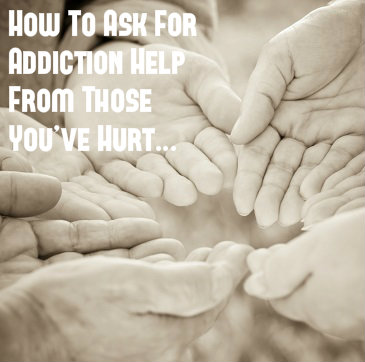 Shame is a terrible symptom of substance abuse and addiction and a common roadblock to asking for help. Understand that it is normal to feel this way. The natural response to the shame that accompanies addiction is to bury it and to deny having a problem, but this won’t help you in the long run. Shame means realizing that you are imperfect and once you accept that fact, asking for help becomes easier. No one is perfect and knowing this fact can help you connect with your loved ones who will most likely be ready to support you, even though you hurt them in the past.
Shame is a terrible symptom of substance abuse and addiction and a common roadblock to asking for help. Understand that it is normal to feel this way. The natural response to the shame that accompanies addiction is to bury it and to deny having a problem, but this won’t help you in the long run. Shame means realizing that you are imperfect and once you accept that fact, asking for help becomes easier. No one is perfect and knowing this fact can help you connect with your loved ones who will most likely be ready to support you, even though you hurt them in the past.
Learning more about your addiction can also help you to let go of shame. Read up on addiction and the latest research findings and you will see that it is a disease. Being addicted started with a choice you made, but it persists because it is a true illness that affects you physically and psychologically.
How Do I Get Past The Fear Of Rejection?
Another major roadblock to asking your loved ones for help is the fear that they will turn their backs on you. Why shouldn’t they? After all, you have broken their trust, let them down and maybe you even hurt them emotionally or physically because of your addiction. You probably see yourself now as unworthy of their love and help.
You have to see yourself as worthy of your loved ones’ time and attention. If you can’t see that, you may never ask for the help you desperately need. Think back to a time before your addiction. Remember the kind of person you were and the relationships you had with your family. Maybe you and your sister were best friends. You can probably remember a time when you were a help to your parents, rather than a burden. When you can remember the positives in the past, you can imagine a future in which you are sober again. Your loved ones will remember the old you too and will not likely reject your request for help.
How Do I Ask For Help?
Once you have recognized, acknowledged and gotten past your shame and fear, it’s time to take action. First, pick the person you think is most likely to be ready and willing to support you as you seek recovery from your addiction. For most people this means turning to a close family member, like a parent or a sibling. You know your family and friends best, so choose the person or people you think will help you in spite of all you have done to hurt them.
It never hurts to practice, so plan what you want to say. You might want to start with apologies, but be sure to stick with the main message, which is that you are ready to get help. Acknowledge out loud to your loved ones that you hurt them. They will appreciate that you are not ignoring your past wrongs. Also find a time that is conducive to a long talk. Don’t stop your loved ones on their way out the door. Take the time to find your voice and the courage you need to speak up. You may be pleasantly surprised to find that your loved ones are still there for you.
Read Our Other Inspirational Addiction Posts – Healing From Addiction Can Be Yours Today!
20 Jun 2014
Do Genes Equal Destiny In Addiction?
We know that genes play a role in the development of addiction. No single gene determines whether a person will become addicted to drugs or alcohol because addiction is a complex and chronic disease. There are multiple genes that influence addiction, and environment plays a role as well. We know that genes are important because the number one risk factor for predicting addiction is family history. If you have a family history of addiction, you probably have some of the influencing genes. This does not mean that you are destined to become an alcoholic or a drug addict. It does mean, however, that you need to be aware and careful.
Addiction Is A Complex Disease
 Addiction is not a simple matter of one gene causing the disease. It is also not as simple as defining anyone with a family history of addiction as an addict or future addict. There are so many factors, both genetic and environmental, that influence addiction that it may never be possible to accurately predict if someone will develop an addiction. Because family history is such a strong risk factor, we can be sure that genetics play some role.
Addiction is not a simple matter of one gene causing the disease. It is also not as simple as defining anyone with a family history of addiction as an addict or future addict. There are so many factors, both genetic and environmental, that influence addiction that it may never be possible to accurately predict if someone will develop an addiction. Because family history is such a strong risk factor, we can be sure that genetics play some role.
Those without a family history of addiction may also develop addiction. This shows that environment plays a role as well. Experiencing childhood trauma, such as abuse, or having a mental illness can influence the development of addiction. Still, just because there is a family history of addiction or a personal experience of negative environmental factors does not mean you targeted or marked for life. You still have choices to make about abusing substances.
What If I Have A Family History of Addiction?
With a family history of addiction, you may be carrying some genes that could make you more susceptible to addiction. Remember, though, that drinking or using a drug for the first time is a choice you make. Once you have tried them, you may be more likely than the average person to become addicted, but you never have to take that first step. Genes do not push you to try illegal drugs or to get drunk.
If you are worried about becoming an addict, there are some important steps you can take:
- Abstain -The first and most important thing you can do is simply to abstain from drinking at all and from using illegal drugs. If you need to use prescription drugs that are habit-forming, follow your doctor’s instructions regarding dosing and talk to your doctor about addiction concerns.
- Seek counseling – If you have a family history of addiction, someone in your life likely caused you emotional distress, or worse, because of their addiction. Talking about it with a therapist can help you resolve any issues you have regarding this person and can help strengthen your determination to stay sober.
- Choose sober friends – If you have never struggled with addiction yourself you do not necessarily need to stay away from people who drink, but it can help to surround yourself with friends who also choose sobriety. When you spend too much time with people who are drinking or using drugs, they may try to pressure you to join in. You don’t need that extra pressure.
- Develop a healthy lifestyle – A great way to ensure that you don’t need to use drugs or alcohol is to live a life where there’s no room for substance abuse. Develop a strong social life with supportive friends and family. Engage in fulfilling and enjoyable hobbies and activities. Eat regular, well-balanced meals, exercise and stay healthy and you will have no need for substance abuse.
Always remember that genes for addiction are not destiny. You have the power to make choices in your life and to create the kind of life you want to have. By staying positive, surrounding yourself with supportive people and avoiding drugs and alcohol, you will be taking proactive steps that will make it less likely that family history will repeat itself.
Call Us Now If You Or A Loved One Is Struggling With Addiction – We Are Available 24/7!
Attention deficit hyperactivity disorder, or ADHD, is a common behavioral disorder in childhood. If you have a child with ADHD you are far from alone. Many kids use medication as part of the treatment for ADHD and there have been some concerns that these drugs could lead to later problems of substance abuse. Whether ADHD medications cause an increased risk for later addiction is not fully known, but what is certain is that you as a parent have the biggest influence over your child’s choices.
ADHD Treatment And Medications
 Experts agree that the best way to treat the symptoms of ADHD, which include hyperactivity, inability to focus or concentrate, and impulsive behaviors, is with both therapy and medication. Using drugs alone is not the best solution to helping kids with ADHD. When they learn to modify their behaviors and are given medications to help them better focus, they have the best odds of success.
Experts agree that the best way to treat the symptoms of ADHD, which include hyperactivity, inability to focus or concentrate, and impulsive behaviors, is with both therapy and medication. Using drugs alone is not the best solution to helping kids with ADHD. When they learn to modify their behaviors and are given medications to help them better focus, they have the best odds of success.
The medications that are used to treat ADHD are stimulants. Although it may seem counterintuitive, these stimulants actually help children to focus, to concentrate on one thing at a time, and to be able to control impulses. There are different kinds of stimulants used for ADHD, including Ritalin, Concerta and Adderall, among others. Children needing one of these drugs may have to try a few before finding the right one and the right dose that maximizes benefits while minimizing side effects.
Will ADHD Medications Cause Future Drug Abuse?
There has been controversy surrounding the use of stimulant medications to treat ADHD in children, but nothing has yet outweighed the benefits that these drugs have given kids. Some claim that kids are overmedicated and the drugs can cause lasting harm, although there is no evidence for this. One very real problem is abuse of ADHD prescriptions. It is not uncommon for teens and college students to use these drugs (which are mostly amphetamines) in large quantities to stay up late for studying and writing papers. This abuse can definitely lead to addiction.
Another controversy has been the fear that even the use of ADHD medications by kids following a doctor’s instructions could lead to future addiction. A few studies have made this connection, but have failed to show whether it was conclusively the drug or other factors that led to later drug abuse. A more recent review of these kinds of studies failed to find real and substantial evidence that ADHD drugs cause a child to abuse drugs or become addicted to drugs later in life.
The review included 15 separate studies and more than 2,000 participants. The result was that being medically treated for ADHD has no connection to future drug abuse. It neither increases nor decreases the risk of drug addiction. An interesting finding is that simply having ADHD can increase a child’s risk of future drug abuse; it seems likely that treating the disorder could therefore reduce the risk.
Good News For Parents Of Children With ADHD
The good news for parents of children with ADHD is that stimulant medications are largely helpful. As long as there are no serious or disruptive side effects the drugs can help kids focus in school, get along with peers better, and be more successful. The risk of developing substance abuse problems later in life is not related to medication.
In fact, what all experts know is that parents’ influence and behaviors is the biggest determining factor in whether a child abuses drugs. Talk to your children about drug abuse and develop a healthy relationship and you can steer them in the right direction.
Read More About Mental Health, Teens And Addiction
Adolescence – that interesting, exciting, and challenging period of life that ever one of us has to go through. Of course, some seem to stay perpetually stuck there emotionally, long after they’ve left their teen years behind. But for most, it’s a several-years-long transition from childhood to adulthood. The journey is often bumpy, even for the teens that seem to have things reasonably together.
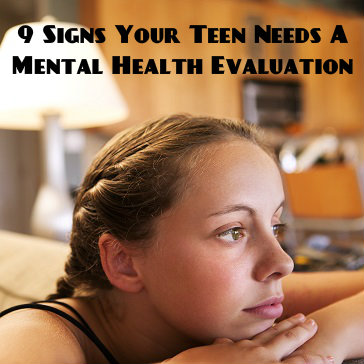 Unfortunately, though, some teens really struggle during this phase of life – beyond what would (or should) be considered normal adolescent ups and downs. It can be hard, as a parent, to know when to take the attitude of “this, too, shall pass” versus “it’s time to seek professional help for our son / daughter”. Sometimes there’s a significant gray area, and multiple factors need to be considered. But more often than not, the signs are pretty clear – if you’re paying attention; that can be a challenge for parents with harried schedules and plates overflowing with obligations and responsibilities.
Unfortunately, though, some teens really struggle during this phase of life – beyond what would (or should) be considered normal adolescent ups and downs. It can be hard, as a parent, to know when to take the attitude of “this, too, shall pass” versus “it’s time to seek professional help for our son / daughter”. Sometimes there’s a significant gray area, and multiple factors need to be considered. But more often than not, the signs are pretty clear – if you’re paying attention; that can be a challenge for parents with harried schedules and plates overflowing with obligations and responsibilities.
Since this phase of your child’s life will have a significant impact on his or her future, the sooner mental health issues are addressed, the better. Following is a list of indicators that your teen likely needs mental health treatment – or at the very least needs an evaluation by a psychologist or other mental health professional. If after reading through them, you’re still hesitant or unsure, at least take your teen in for an evaluation to determine whether or not treatment is necessary.
Remember, many parents tend to view their teens through at least somewhat rose-colored glasses, minimizing or turning a blind eye to serious issues. Sadly, doing so can have very serious repercussions down the road. Better to err on the side of caution than to ignore problems or assume things will work themselves out. If treatment is warranted, it’s absolutely in your teen’s best interest to take that step now rather than later (or even worse, never).
9 Warning Signs Your Teen Needs A Mental Health Evaluation
1 – Your teen is having problems functioning on a day to day basis. One of the primary criterion for practically every disorder listed in the DSM (the diagnostic manual used by mental health professionals) is that the symptoms are severe enough to interfere with day to day functioning or significantly impact at least one or more major area of life (e.g. relationships, school, or work). For example, it’s normal to occasionally feel sad or blue, but it’s not normal to self-mutilate when sad or angry, or become completely withdrawn for weeks at a time.
Signs that your teen isn’t functioning normally may include:
- A notable drop in grades
- Frequent absences or tardiness at school or work
- Decrease in personal hygiene
- Difficulties concentrating
- Bizarre behavior
- Low energy
- Difficulties making decisions
- Inability to cope with minor frustrations
Some psychiatric problems develop quickly, while others develop slowly over time. It’s always important to note any negative changes from your teen’s prior behavior. While it may be temporary, it can also be a sign of something serious.
2 – Your teen appears depressed, sad, withdrawn, or “blue” much of the time, or is often tearful or irritable. Each of these is a potential indicator of depression. As mentioned above, feeling sad or blue from time to time is perfectly normal – it’s part of being human. But it’s important to realize that, even with teens, an often depressed mood is not normal and needs to be addressed.
Many children and teens struggle with undiagnosed depression, suffering in silence for months or even years. Parents and other adults may mistakenly attribute an introverted, quiet demeanor to their personality rather than realizing depression is the real culprit. With proper treatment, a formerly depressed, withdrawn teen can become surprisingly outgoing.
It’s important to note that a significant loss (e.g. the death or loss of a friend, close relative, or beloved pet, or even a major move) can trigger profound feelings of sadness in your teen. However, while grieving is normal, healthy, and necessary, some teens don’t cope well with loss and get stuck in their grief. A major loss can trigger depression as well as exacerbate an existing depression.
While an episode of depression can be short-lived (e.g. a few weeks), it can also last for years – especially if left untreated. It can also lead to other serious problems for teens, increasing their risk for suicide, substance abuse and addiction, and serious academic problems. A drop in grades can make it difficult for them to get into college, and an ongoing or recurring battle with depression can negatively impact their performance if they do get in.
3 – Your teen has intense or rapid mood swings. Adolescent angst – it’s normal, right? Well, yes – to some degree. After all, teens are notorious for being moody, which is often attributed to hormonal changes and fluctuations. However, while occasional or mild moodiness may be normal, frequent intense or rapid shifts in moods shouldn’t be ignored.
Even in teens, a generally upbeat (or at least neutral) mood is a good indicator of healthy psychological functioning and emotional stability. Significant deviations from that may be a sign of psychiatric problems, including depression, bipolar disorder, or borderline personality disorder.
Keep in mind, if your teen is using alcohol or drugs, those substances can also cause erratic or intense mood fluctuations. Significant stress (e.g. parental separation or divorce, or a recent breakup with a boyfriend or girlfriend) can also make your teen moodier than usual. If the mood swings are persistent, an evaluation is warranted. Even if stress is the primary cause (as opposed to a diagnosable disorder), a skilled therapist can help your teen learn healthy coping skills that will be beneficial for years to come. If substance abuse is the cause, early intervention is essential.
4 – Your teen is frequently using alcohol or drugs (which can include prescription drugs, OTC medications, and inhalants) to cope with stress or negative emotions, or fix a problem. It goes without saying that substance use in teens should never be taken lightly. Teens may think it’s expected and acceptable to drink with their friends and experiment with drugs, but the consequences can be devastating. Not only are many substances potentially addictive (leading to more serious long-term problems), they will also impair your teen’s judgment.
With regards to the need for mental health treatment, many teens start drinking or using regularly as a way to “self-medicate” psychiatric symptoms, such as anxiety or depression. They may also turn to illicit substances to enhance athletic performance, quickly drop unwanted pounds, or stay alert while studying for exams. A few beers can quiet racing thoughts, while a friend’s ADHD medication can temporarily boost a negative mood. Your teen may think they’re harmless enough (especially if they are “acceptable” substances, like alcohol or prescription drugs), but it’s an especially serious matter when they’re used to escape, cope, or fix a problem. This is because every time they provide even a little relief or benefit, the desire to use them again is significantly reinforced.
If your teen has a substance abuse problem and a mental health condition, he or she would be a good candidate for what’s known as “dual diagnosis” treatment. Treating only the substance abuse issue or only the mental health disorder will set your teen up for failure. Treating both disorders simultaneously is the best way to ensure a positive outcome and prevent a relapse down the road.
5 – Your teen is preoccupied with his or her weight or physical appearance, and / or has notable issues with eating and food in general. Body image issues and eating disorders often emerge during adolescence. Teens experience significant growth spurts and hormonal changes – both of which can cause problems such as acne and unwanted weight gain (as well as being too thin). They’re also becoming keenly aware of their sexuality. This can be particularly scary for teens with a history of sexual abuse (who may try to thwart the development of curves by starving themselves or binge eat in order to gain enough weight to be undesirable). Other teens feel a desperate need to make themselves more attractive typically involves being thin.
Combine society’s pressure to be thin and beautiful (or muscular and athletic), poor coping skills, and a fragile self-esteem, and you’ve got the perfect recipe for an eating disorder (such as anorexia or bulimia) or another, lesser-known disorder known as “body dysmorphic disorder” (BDD). Eating disorders and BDD not only often go hand in hand; they can also trigger or worsen other disorders, such as depression, anxiety, and substance abuse disorders.
Eating disorders can be especially serious because they often cause significant medical health issues and, for some, permanent physical damage. Anorexia, which is one of the most well-known eating disorders, is also one of the most deadly mental health conditions.
It’s important to note that serious body image issues and a severely dysfunctional relationship with food don’t just affect females. Adolescent males are also vulnerable to developing eating disorders as well as BDD.
6 – Your teen is often anxious or fearful, struggles with obsessions or compulsions, or worries excessively. Anxiety disorders are quite common in children and adolescents. Problems with anxiety can develop gradually or appear suddenly. An abrupt onset is often triggered by a traumatic incident, such as a natural disaster, a school shooting, or being the victim of a violent or sexual assault.
Problems with anxiety often include irrational fears, such as obsessing about having a serious illness or being contaminated by germs, or being terrified by something like spiders or dogs (even if it’s only a photo of a dog or the spider is securely encased in a glass terrarium). Nightmares, nervous habits (e.g. fidgeting, nail biting) and difficulties sleeping are not uncommon in anxious teens.
Occasional fear and worry are normal. However, when anxiety becomes constant, excessive, and / or irrational, it can be paralyzing and interfere with every aspect of your teen’s life.
7 – Your teen is hostile, violent, aggressive, and / or has difficulty managing anger. A teen who’s often angry, irritable, destructive (to self or others), violent, or hostile is a teen who needs help. When any of these behaviors or emotionsoccurs – especially frequently or regularly – it’s a red flag that needs to be taken very seriously.
Angry kids often become angry – and destructive – adults. They’re more vulnerable to accidents, substance disorders, suicide attempts, depression, and abuse or violence towards others. They’re also going to have serious problems at school, at work, and in their relationships.
These particular behaviors and emotions may be due to a variety of factors, including substance use (e.g. steroids, alcohol, or stimulants), trauma, mood disorders, psychosis (e.g. grandiose or paranoid delusions), and personality disorders. Even if your teen doesn’t meet the criteria for a specific disorder, therapy can help him or her learn to manage intense emotions and aggressive impulses.
8 – Your teen has experienced a recent trauma. Although not every teen needs therapy after being subjected to a traumatic event, it’s always wise to have him or her evaluated. Traumatic events are difficult enough for adults with good coping skills and a strong support system. Teens, however, often have yet to fully, or at least sufficiently, develop the skills required to sustain them when their world is turned completely upside down by trauma.
If your teen is having flashbacks, frequent nightmares, experiencing depression or anxiety, having trouble sleeping, or avoiding people, situations, or places that remind him or her of the trauma, treatment is likely necessary.
9 – Your teen is preoccupied with, is threatening, or has attempted suicide. Adolescence is one of the highest risk age groups when it comes to suicide. One of the reasons for this is that teens tend to be very impulsive. They also have a difficult time seeing the bigger picture and realizing that they can and will get through something that – at least in the moment – feels absolutely unbearable, such as the devastating, unexpected end of a romantic relationship.
Suicidal talk, threats, and attempts should always be taken very seriously. Countless parents who have lost a son or daughter to suicide would be quick to say they’d give anything to go back in time and heed the signs – signs that, in retrospect (at least in their minds), should have been so obvious.
Any preoccupation with suicide and death can be a potential clue that your teen is toying with the idea of ending his or her life. Threats are an even stronger indicator. Although some threats are idle, don’t make the mistake of assuming that your teen is just being dramatic. An angry or upset impulsive teen may make a serious attempt, resulting in permanent physical damage or death – even though he or she had no real intention of dying and just wanted to get your attention.
A suicide attempt – even if non-life-threatening – should always be taken very seriously. A naïve teen may think 4 or 5 Tylenol pills or a superficial cut to the wrist are enough to cause death. Don’t underestimate the seriousness of their actions. Additionally, one of the greatest predictors of future suicide attempts is a history of prior attempts.
Keep in mind that suicide isn’t always due to depression. Even when it is, the signs of depression may be subtle. Some teens may get involved in a suicide pact with friends for various reasons. Others may have been depressed, but once they made the decision to end their life they started feeling better. Ironically, a decision to commit suicide can be empowering and actually boost one’s mood, leaving others more baffled than ever when the person – who no longer seemed depressed – ends his or her life.
Any and all suicidal talk, threats, and behaviors warrant an evaluation by a mental health professional as soon as possible.
As a parent, you have a huge responsibility. Teens often lack the insight and maturity to realize when they need help. They also may mistakenly believe that what they’re experiencing is normal or that no one could possibly understand or help them. And, of course, some teens don’t want anyone prying into their personal life. That’s why it’s important to pay attention, keep the doors of communication open, and be ready to take action when needed.
Yes, your child may be mad at you for a while if you make him or her “see some stupid shrink”. But wouldn’t it be far better to endure a brief period of adolescent petulance than watch your precious child suffer for months or years with an undiagnosed, untreated mental health issue – especially one that could have been overcome or significantly alleviated and managed with proper (and early) treatment?
If You Think Your Teen Is Suffering Emotionally Or With A Mental Health Issue, Call Us Now, We Are Here To Help!
Social anxiety is a term used to describe the presence of substantial feelings of unease, tension or fear in social settings that most individuals don’t view as particularly negative or harmful. People seriously affected by these feelings may qualify for a diagnosis of a mental health condition called social phobia or social anxiety disorder. In a study published in January 2014 in the Journal of Studies on Alcohol and Drugs, researchers from Louisiana State University examined the connection between social anxiety and the chances that a college undergraduate will use marijuana or other forms of cannabis. These researchers found that socially anxious people tend to use cannabis only when they believe that certain social norms support this behavior.
Identifying Social Anxiety Disorder
Doctors consider diagnosing social anxiety disorder in people whose levels of social anxiety interfere with their ability to maintain a reasonable sense of mental equilibrium or participate in various aspects of a typical daily routine. Symptoms commonly found in people affected by serious social anxiety include:
 fear of judgment from others
fear of judgment from others- unease in the presence of others
- difficulty communicating with others
- tendency to avoid voluntary social contact
- extreme self-consciousness or easy embarrassment
- difficulty establishing or maintaining friendships
Physical indicators of social anxiety are:
- nausea
- excessive sweating
- blushing in social situations
Most people first develop tendencies toward social anxiousness in early childhood or during their teenage years. Equal numbers of men and women experience symptoms profound enough to merit a social anxiety disorder diagnosis.
What Are Social Norms?
A social norm is a spoken or unspoken rule that helps govern the ways people interact in interpersonal, group or community settings. Some norms only operate on a relatively small scale (e.g., within a family or a close peer group), while others may operate on several levels or only on a broader social scale. As a rule, certain norms only have an effect when an individual believes that important or powerful people in his or her social group also endorse those norms. Other norms don’t necessarily receive an endorsement as acceptable behavior; nevertheless, they have an impact because an individual sees respected or influential people following them in everyday life. Broadly speaking, any person’s social environment is formed from a combination of norms he or she should follow and norms he or she actually follows.
Social Anxiety, Norms And Cannabis Use
In the study published in the Journal of Studies on Alcohol and Drugs, the Louisiana State University researchers looked at the interactions between social anxiety, cannabis use and the desire to follow social norms. They conducted their work with the help of 230 undergraduates at the university who were known users of marijuana or some other form of cannabis (i.e., hashish or hashish oil). The researchers undertook their study for a couple of reasons. First, mental health professionals and addiction specialists know that socially anxious people may develop problems with marijuana use more often than the general population. In addition, despite this fact, researchers know very little about how social norms influence the drug-using behaviors of socially anxious people.
After analyzing the social anxiety levels, social norms regarding cannabis use and actual cannabis-related behaviors in the study participants, the researchers concluded that social norms do have a significant impact on the chances that a socially anxious person will or won’t use cannabis or develop significant cannabis-related problems. However, perhaps surprisingly, the main influencing norms come from college students’ parents, not their peers. When a socially anxious student believes that his or her parents have a favorable view of cannabis use, the odds for participation in cannabis use increase substantially. In addition, a socially anxious student who believes his or her parents follow pro-cannabis norms has a greater chance of developing relatively minor and relatively severe problems related to cannabis intake. Conversely, a college student affected by social anxiety tends not to get involved in cannabis use when his or her parents regularly express anti-cannabis points of view.
The authors of the study published in the Journal of Studies on Alcohol and Drugs do not discount the potential of social norms established among peers to influence a socially anxious college student’s chances of using cannabis or experiencing cannabis-related harm. However, they note that parental influences appear to play a much more prominent role. The study’s authors believe that their work can help deepen understanding of the factors that can potentially contribute to the onset of diagnosable cannabis use disorder (cannabis abuse or addiction) in people affected by social anxiety.
Peer pressure is a powerful force. You probably remember experiencing it yourself. It can take tremendous strength of will to say no in the face of your peers urging you to do something. If you have a teenage son or daughter, remembering what peer pressure was like might keep you up at night. The good news is that you have the potential to be the most powerful influence in the lives of your children. If you take the time to help your teen understand the dangers of risky behaviors, keep open communication and get to know your teen, you can help her successfully resist peer pressure.
What Is the Role of Peer Pressure in Adolescence?
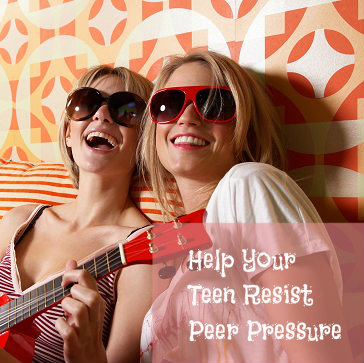 It turns out that peer pressure is normal and that it’s not always a negative thing. Teens are learning how to become adults by learning how to fit in with peers. While always conforming to the standards of others is not good, neither is standing out all the time. To grow into adults that contribute in meaningful ways, teens need to learn to strike a balance. They need to fit into social groups while also learning to make their own decisions.
It turns out that peer pressure is normal and that it’s not always a negative thing. Teens are learning how to become adults by learning how to fit in with peers. While always conforming to the standards of others is not good, neither is standing out all the time. To grow into adults that contribute in meaningful ways, teens need to learn to strike a balance. They need to fit into social groups while also learning to make their own decisions.
We tend to think of peer pressure among teens as always leading to dangerous behaviors, such as having sex, trying drugs, drinking or shoplifting. These are the sorts of incidences in which peer pressure is negative. On the other hand, your teen may be pressured by friends to go out when she is feeling down after a breakup, or they may pressure her to join extracurricular activities with them. These are positive pressures. If you can help your teen to understand the difference between positive and negative peer pressure, she will start to make better choices.
How Can You Help Your Teen Recognize And Resist Negative Pressure?
Your teen’s ability to recognize what is right and what is wrong begins with you. By sharing and demonstrating your own values, you pass them down her. If you talk to your teen about what you expect of her and what you value, your influence will be more important than that of her peers. It can be easy to lose sight of this fact during the teen years. The time your child spends with her friends can make you begin to feel as if your opinions no longer matter, but it isn’t true.
Sharing your values with your child will help her to recognize the difference between positive and negative peer pressure, but she also needs to be able to resist the latter. One of the most important things to do is to cultivate open lines of communication. When your teen knows that she can talk to you, she will bring her issues to you for discussion. If you don’t know that she is experiencing peer pressure, you can’t help her.
When you do talk to your teen about what is troubling her, give her suggestions for how to say no. Encourage her to stick with friends who have the same values. There is strength in numbers. Cultivate her self-esteem so that she feels confident being assertive in pressure-filled situations. Self-esteem comes from being able to accomplish goals and by being good at things, so encourage her to get involved in activities she enjoys and is good at. This could be sports teams, academic clubs, theater groups or any other healthy activity.
Peer pressure may be a powerful force, but good parenting is even stronger. Develop a good relationship with your teen that involves open communication and you will help her resist making bad choices based on pressure from her peers.
Learn More About How To Combat Peer Pressure


